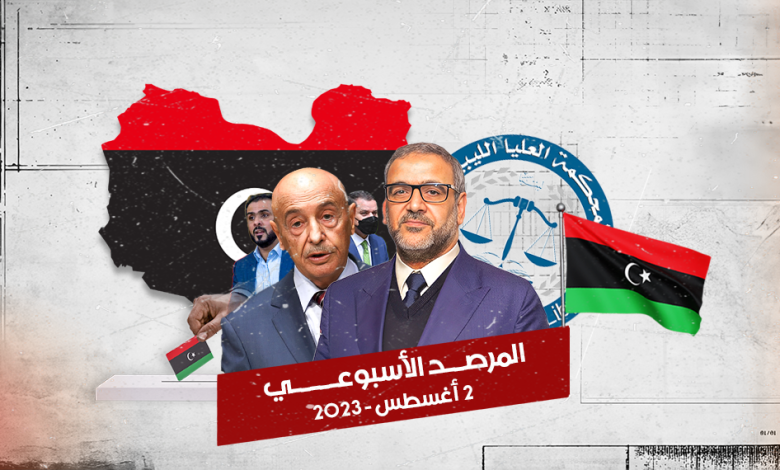Weekly Observatory 02-Aug-2023

Preface
In this paper , we seek to shed light on a summary of the current political events during the previous period , and we aim to read an analytical view of some positions , and try to understand their context and present them to those interested , to contribute and raise awareness about the events and their developments.
-
” Roadmap” .. Between the two councils and the rejection of the mission
The House of Representatives and the Supreme Council of State of Libya have approved a new roadmap for elections, Amid fears of its failure, The map calls for elections to be held within 240 days from the date of the issuance of electoral laws. And the formation of a new mini-government to replace the two existing governments – “the government of Dabaiba and the government of Hammad”.
However, Election laws have not yet been adopted, There is even disagreement over the composition of the new government, There are also fears that the map will not be able to end the political division in Libya, The map also faces the lack of adoption of electoral laws so far. In addition to the efforts of the Prime Minister of the Government of National Unity, “Abdul Hamid Dabaiba”, which has become equivalent to the two councils in thwarting the plans of the other side.
In addition, The UN mission issued a statement warning against taking any unilateral step in addressing the political impasse.
“Any unilateral actions could lead to serious consequences, cause further instability and provoke violence,” the mission said. The UN mission added that “the political process in Libya is at a critical stage that requires a comprehensive political agreement with the acceptance and participation of all actors.” The mission explained that Envoy Batili is intensifying his contacts with all parties to reach a settlement that will make the draft electoral laws implementable and agree on the establishment of a new unified government, The UN mission warned against all actions that undermine the demands of the people to hold national elections that legitimize Libyan institutions in a peaceful and democratic manner.
The Presidency of the House of Representatives and the Supreme Council of State tends to impose a change of government. Amid expectations that the two houses will begin the procedures for candidacy for the post of prime minister and vote on nominations soon.
In the same vein, The UN envoy, Abdullah Batili, warned in a statement, that it is important to resolve the issue of the two governments in the country, All parties must also participate in the political process to reach a comprehensive national agreement. “Some of the proposed provisions in the election laws may create political conflicts,” he said in his statement.
However, the elections for the presidency of the High Council of State are coming on the way, And its date falls within a few days, These elections constitute a major event as the current president – Al-Meshri – is betting on winning them. However, there is a strong opposition within the Council supported by the Dbeibeh government, may pose a challenge to the ambition of the current president, Al-Mishri may resort to postponing it in order to advance on the road map. This will be a cause for further tension within the High Council of State.
At the procedural level, If the process of reviewing electoral laws and addressing what UNMIK considered deficiencies is not yet clear, This imbalance will hinder the understandings of the two chambers on the change of government, The result will be a repeat of the scenario of the Libyan government led by Fathi Bashagha, And conclude to add a new name to the presidency of the government in the arena of conflict and perpetuate the current crisis.
Naturally , Reaching the bottleneck of aggravation and entering a state of stalemate again may give way to pushing alternatives, Including the initiative of the UN mission related to the “High-Level Committee”, Especially with the lack of reliance on a local mechanism led by a significant body “such as the judicial institution”, After the conflict that afflicted the judicial institution recently, This was caused by the policies of the House of Representatives regarding the reorganization of the judiciary.
And in general, The context of events refers to, That the political situation in Libya is unstable, It is uncertain to proceed with any of the paths that can lead to stability and access to the expected electoral entitlement, Because there are many challenges to the proper implementation of the roadmap, Which can lead to more tension and conflict.
-
The Libyan judiciary in the tunnel of political conflict
Enter the House of Representatives, The judicial institution is in the circle of conflict between its members, Since he issued a decision to make amendments to the Judicial System Law at the end of November 2021, Orders the dismissal of the former President of the Supreme Court, “Mohammed Al-Hafi”, From the Presidency of the Supreme Judicial Council, Then a law establishing a constitutional court was promulgated, Transfer the powers of the Constitutional Chamber of the Supreme Court to it.
The decision of the House of Representatives today, Having issued the Constitutional Chamber of the Supreme Court, a ruling on the unconstitutionality of the decision of the House of Representatives, on the judicial system.
And recently, On July 12, the House of Representatives reappointed Counselor Miftah al-Qawi as head of the Supreme Judicial Council. After his vote to approve a new amendment related to the Judicial Law in a session chaired by Aguila Saleh, The appointment of the “strong” coincided with the demand of a number of demonstrators in front of the headquarters of the Supreme Judicial Council in Tripoli, Empowering the President of the Supreme Court, Abdullah Abu Raziza, of the Presidency of the Council.
Later, The House of Representatives announced in a statement that an armed group stormed the headquarters of the Supreme Judicial Council in the capital, Tripoli, He expressed his condemnation and denunciation of this attack.
In this sense, The judicial crisis in Libya is seen as profound and affecting the judiciary’s ability to perform its function of separation of powers. It is unclear whether the dispute will be resolved soon. But it is likely that it will continue to influence Libya’s future, It will be considered one of the biggest challenges facing the future of the country at all levels, Security, political and electoral, It is not far from the way that this wrestling will be used by the judiciary in a potentially upcoming election game.
To download the file, click here

